

SUBSCRIBE TO OUR FREE NEWSLETTER
Daily news & progressive opinion—funded by the people, not the corporations—delivered straight to your inbox.
5
#000000
#FFFFFF
To donate by check, phone, or other method, see our More Ways to Give page.


Daily news & progressive opinion—funded by the people, not the corporations—delivered straight to your inbox.

Pete Seeger sings and his banjo states: THIS MACHINE SURROUNDS HATE AND FORCES IT TO SURRENDER.
Born: 3 May 1919, New York City, NY
Died: 27 January 2014, New York City, NY
I released these photos last year after this performance in Buffalo, NY. I believe this was the second to the last performance by Pete Seeger. I thought it would be appropriate to re-release them in remembrance of what would have been his 95th birthday, this Saturday, 3 May 2014.
All photos by Orin Langelle.
On Saturday 9 November 2013, Global Justice Ecology Project Executive Director, Anne Petermann, and I went to the Buffalo (NY) Niagara Convention Center to see legend Pete Seeger. Seeger, 94 years young, played at the Western NY Peace Center's 46th Annual Dinner.

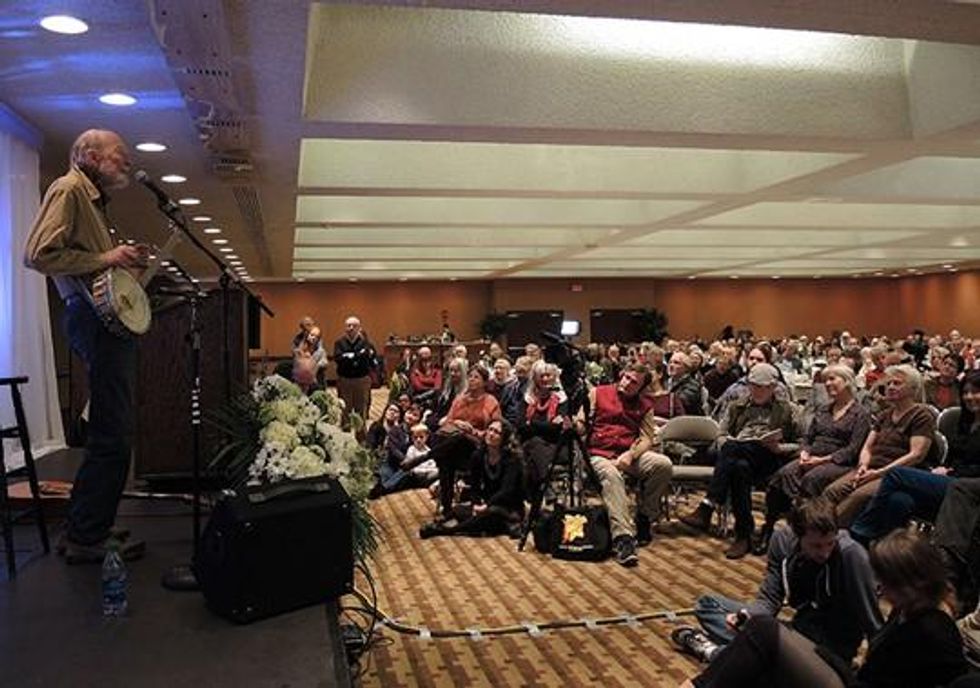
I do not believe there was a spare chair in the venue last Saturday night.
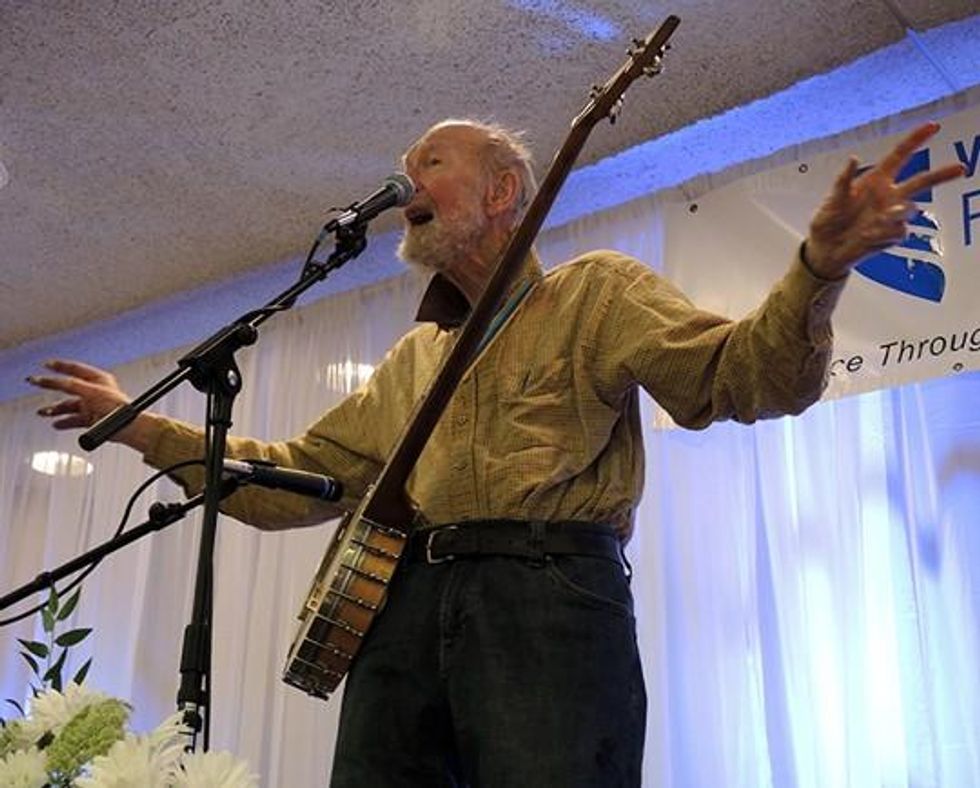
Seeger made a deep impression on my life. I am not sure who to credit, Seeger for writing the song in 1962, or the Book of Ecclesiastes for inspiring Seeger or the Byrds in 1965 for covering, "Turn! Turn! Turn! (to Everything There Is a Season)". To make a long story short, I was the editor of a high school newspaper in a what I now deem a "thought prevention and adjustment facility." I wrote an editorial against the Vietnam War using words from "Turn! Turn! Turn!" I got canned as the editor. Here is a look at some of my activism.
Some of my photos that follow are interspersed with excerpts from The Parabolic Pete Seeger(Artvoice, Vol. 12, No. 44) by Buck Quigley
...At 94, Seeger says this is the longest trip he's made from his home near Beacon, New York in years. He is coming as a favor to old friend Chuck Culhane, chair of the Prison Action Committee at the Western New York Peace Center. The story of their friendship is remarkable, beginning in 1971 when Culhane wrote Seeger a letter from his New York state prison cell. The latter replied that he was honored to receive the note, and they continued to correspond. Years later, Seeger would serve as best man at Culhane's wedding.
AV: What did it feel like as a folk singer when the Weavers suddenly had a number one hit with "Goodnight Irene" in 1950?
Seeger: [Laughs.] Well, unexpected things always happen. For a short while, we were at the top of the hit parade, as they called it then. We went from one expensive gin mill to another--the Palmer House in Chicago, the Thunderbird Hotel in Las Vegas, Ciro's in Hollywood.
AV: So there you are at the top in 1950, and later that decade you are blacklisted during the McCarthy era.
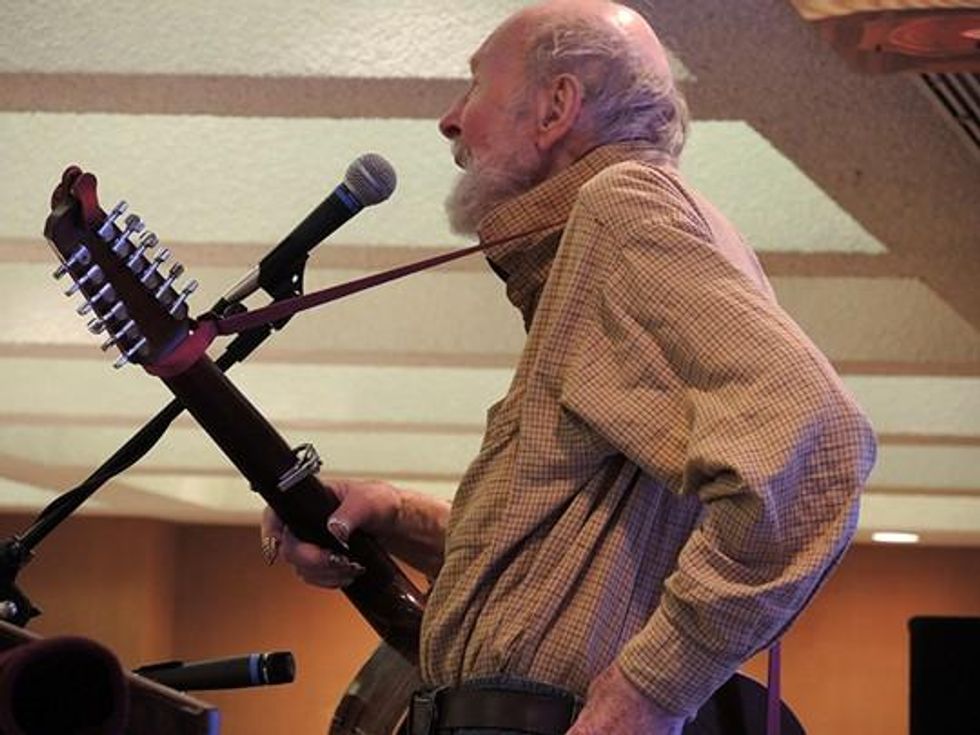
Seeger: Yes.
AV: What did that feel like?
Seeger: Well, it didn't bother me a bit. I didn't want to work in gin mills anyway. I like to sing in cheap summer camps for children, or to college kids--and I made a very good living that way. I didn't need to work in gin mills.
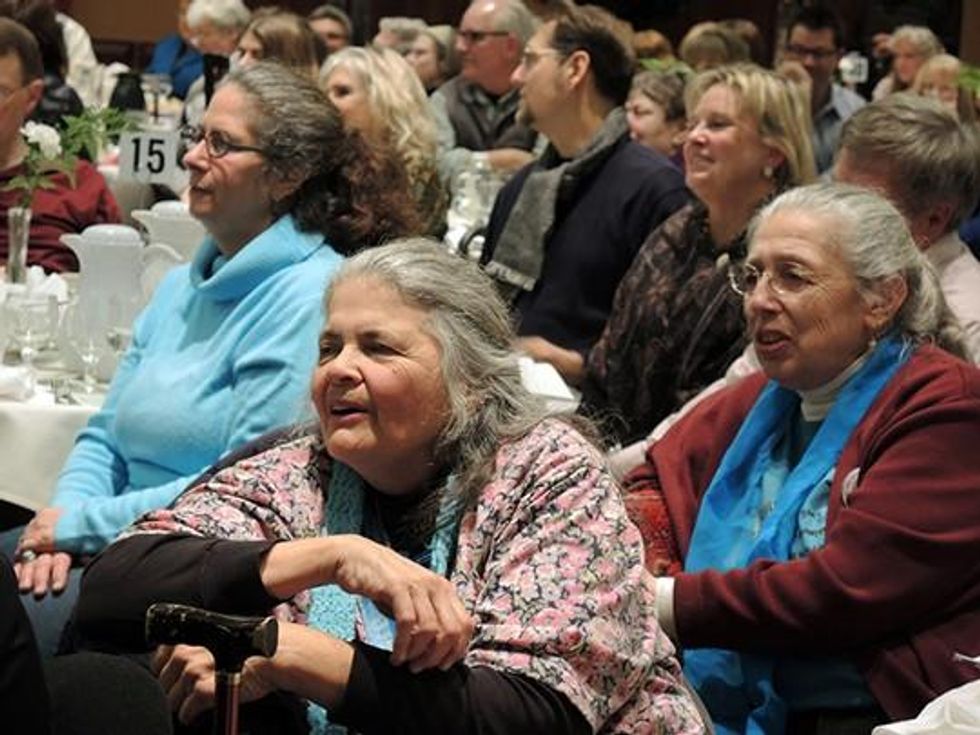
AV: And you entertained a lot of people along the way, and built quite a legend doing so... Well, you've planted a lot, and a lot have grown for the better in the world.
Seeger: Well, my hope for the world is there are so many millions of little local things that are going on that the world will be saved. The people with money can break up any big thing they want--but what are they going to do about millions of little things?
AV: Here's a question that you've addressed before, but it's become something of a legend and I wanted to ask you since I have the opportunity: How angry were you when Dylan went electric at the Newport Folk Festival in 1965?
Seeger: Well, I was not angry at Bob. He was singing one of his best songs, but I couldn't hear a single word that he was singing because they had the instruments turned up so high. I went over to the man at the controls and said, "Turn the instruments down, so I can hear Bob singing." And they shouted back: "No! This is the way they want it." Al Grossman and other people wanted Bob to break with the folkies. [laughs] I was so angry I said, "Dammit, if I had an axe, I'd cut the cable!" [Laughs.] But I wasn't angry at Bob, or the song--it's a good song.
AV: Which song was it?
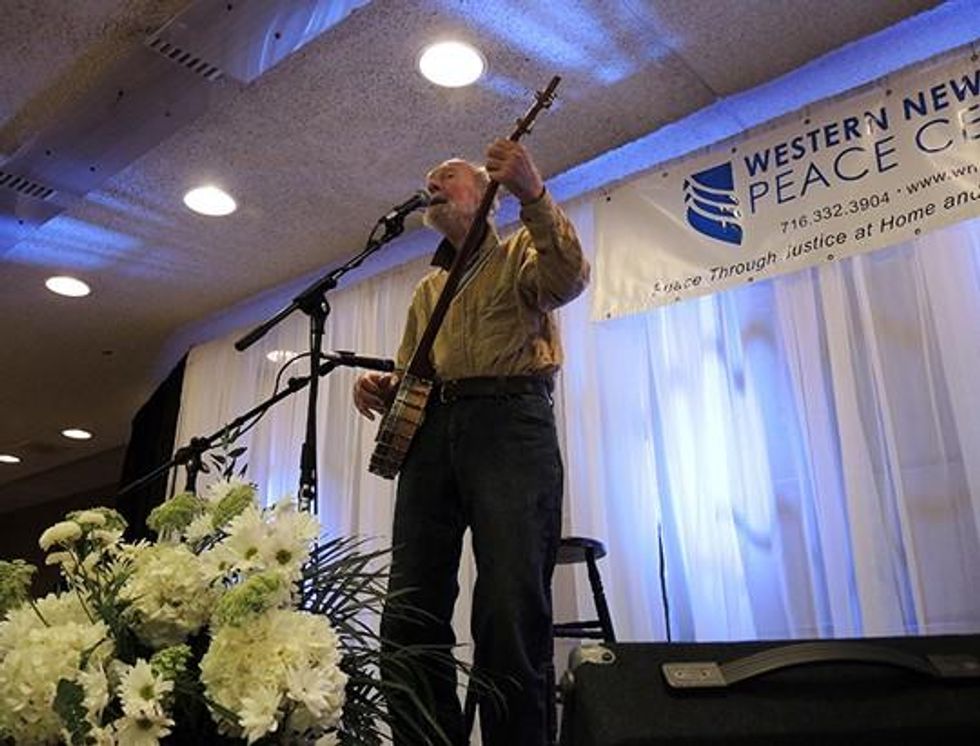
Seeger: "Maggie's Farm." [Sings.] "I ain't gonna work on Maggie's farm no more."
AV: To what do you attribute your enduring coolness?
Seeger: Coolness? I don't know what you mean by coolness.
AV: I guess what I mean is that every generation there is a crop of younger people who get turned on to your music, and it resonates generation after generation. For lack of a better word, I was saying that people keep thinking you're cool.
Seeger:...I believe in communication. Communication will save the world.

AV: the seven-year-old kids, they get it.
Seeger: ...There's lots of things we could talk about. My slogan is the one from the great French biologist Rene Dubois: "Think globally, act locally." If the human race is still here in a hundred years, it will be the arts which save us. Not just the musical arts and the visual arts, but the cooking arts--and most important, the art of humor.
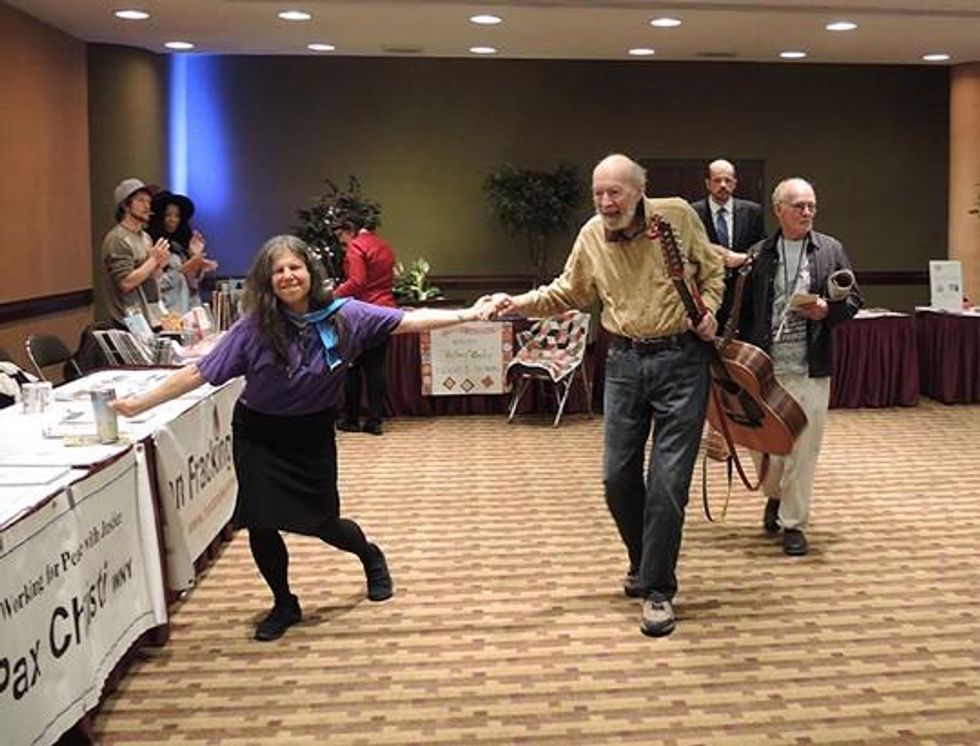
Thanks Pete for all you did to improve the world. - Orin Langelle
All photographs are copyrighted by Langelle Photography (2014), all rights reserved. No photo can be used without the consent of Langelle Photography. See Publishing and Acquisition Information.
Why Copyright? One of the reasons I copyright my photographs is to track where these photos are being used in order to monitor the impact of my work and evaluate the effectiveness of Langelle Photography, a nonprofit organization.
Trump and Musk are on an unconstitutional rampage, aiming for virtually every corner of the federal government. These two right-wing billionaires are targeting nurses, scientists, teachers, daycare providers, judges, veterans, air traffic controllers, and nuclear safety inspectors. No one is safe. The food stamps program, Social Security, Medicare, and Medicaid are next. It’s an unprecedented disaster and a five-alarm fire, but there will be a reckoning. The people did not vote for this. The American people do not want this dystopian hellscape that hides behind claims of “efficiency.” Still, in reality, it is all a giveaway to corporate interests and the libertarian dreams of far-right oligarchs like Musk. Common Dreams is playing a vital role by reporting day and night on this orgy of corruption and greed, as well as what everyday people can do to organize and fight back. As a people-powered nonprofit news outlet, we cover issues the corporate media never will, but we can only continue with our readers’ support. |
Born: 3 May 1919, New York City, NY
Died: 27 January 2014, New York City, NY
I released these photos last year after this performance in Buffalo, NY. I believe this was the second to the last performance by Pete Seeger. I thought it would be appropriate to re-release them in remembrance of what would have been his 95th birthday, this Saturday, 3 May 2014.
All photos by Orin Langelle.
On Saturday 9 November 2013, Global Justice Ecology Project Executive Director, Anne Petermann, and I went to the Buffalo (NY) Niagara Convention Center to see legend Pete Seeger. Seeger, 94 years young, played at the Western NY Peace Center's 46th Annual Dinner.


I do not believe there was a spare chair in the venue last Saturday night.

Seeger made a deep impression on my life. I am not sure who to credit, Seeger for writing the song in 1962, or the Book of Ecclesiastes for inspiring Seeger or the Byrds in 1965 for covering, "Turn! Turn! Turn! (to Everything There Is a Season)". To make a long story short, I was the editor of a high school newspaper in a what I now deem a "thought prevention and adjustment facility." I wrote an editorial against the Vietnam War using words from "Turn! Turn! Turn!" I got canned as the editor. Here is a look at some of my activism.
Some of my photos that follow are interspersed with excerpts from The Parabolic Pete Seeger(Artvoice, Vol. 12, No. 44) by Buck Quigley
...At 94, Seeger says this is the longest trip he's made from his home near Beacon, New York in years. He is coming as a favor to old friend Chuck Culhane, chair of the Prison Action Committee at the Western New York Peace Center. The story of their friendship is remarkable, beginning in 1971 when Culhane wrote Seeger a letter from his New York state prison cell. The latter replied that he was honored to receive the note, and they continued to correspond. Years later, Seeger would serve as best man at Culhane's wedding.
AV: What did it feel like as a folk singer when the Weavers suddenly had a number one hit with "Goodnight Irene" in 1950?
Seeger: [Laughs.] Well, unexpected things always happen. For a short while, we were at the top of the hit parade, as they called it then. We went from one expensive gin mill to another--the Palmer House in Chicago, the Thunderbird Hotel in Las Vegas, Ciro's in Hollywood.
AV: So there you are at the top in 1950, and later that decade you are blacklisted during the McCarthy era.

Seeger: Yes.
AV: What did that feel like?
Seeger: Well, it didn't bother me a bit. I didn't want to work in gin mills anyway. I like to sing in cheap summer camps for children, or to college kids--and I made a very good living that way. I didn't need to work in gin mills.

AV: And you entertained a lot of people along the way, and built quite a legend doing so... Well, you've planted a lot, and a lot have grown for the better in the world.
Seeger: Well, my hope for the world is there are so many millions of little local things that are going on that the world will be saved. The people with money can break up any big thing they want--but what are they going to do about millions of little things?
AV: Here's a question that you've addressed before, but it's become something of a legend and I wanted to ask you since I have the opportunity: How angry were you when Dylan went electric at the Newport Folk Festival in 1965?
Seeger: Well, I was not angry at Bob. He was singing one of his best songs, but I couldn't hear a single word that he was singing because they had the instruments turned up so high. I went over to the man at the controls and said, "Turn the instruments down, so I can hear Bob singing." And they shouted back: "No! This is the way they want it." Al Grossman and other people wanted Bob to break with the folkies. [laughs] I was so angry I said, "Dammit, if I had an axe, I'd cut the cable!" [Laughs.] But I wasn't angry at Bob, or the song--it's a good song.
AV: Which song was it?

Seeger: "Maggie's Farm." [Sings.] "I ain't gonna work on Maggie's farm no more."
AV: To what do you attribute your enduring coolness?
Seeger: Coolness? I don't know what you mean by coolness.
AV: I guess what I mean is that every generation there is a crop of younger people who get turned on to your music, and it resonates generation after generation. For lack of a better word, I was saying that people keep thinking you're cool.
Seeger:...I believe in communication. Communication will save the world.

AV: the seven-year-old kids, they get it.
Seeger: ...There's lots of things we could talk about. My slogan is the one from the great French biologist Rene Dubois: "Think globally, act locally." If the human race is still here in a hundred years, it will be the arts which save us. Not just the musical arts and the visual arts, but the cooking arts--and most important, the art of humor.

Thanks Pete for all you did to improve the world. - Orin Langelle
All photographs are copyrighted by Langelle Photography (2014), all rights reserved. No photo can be used without the consent of Langelle Photography. See Publishing and Acquisition Information.
Why Copyright? One of the reasons I copyright my photographs is to track where these photos are being used in order to monitor the impact of my work and evaluate the effectiveness of Langelle Photography, a nonprofit organization.
Born: 3 May 1919, New York City, NY
Died: 27 January 2014, New York City, NY
I released these photos last year after this performance in Buffalo, NY. I believe this was the second to the last performance by Pete Seeger. I thought it would be appropriate to re-release them in remembrance of what would have been his 95th birthday, this Saturday, 3 May 2014.
All photos by Orin Langelle.
On Saturday 9 November 2013, Global Justice Ecology Project Executive Director, Anne Petermann, and I went to the Buffalo (NY) Niagara Convention Center to see legend Pete Seeger. Seeger, 94 years young, played at the Western NY Peace Center's 46th Annual Dinner.


I do not believe there was a spare chair in the venue last Saturday night.

Seeger made a deep impression on my life. I am not sure who to credit, Seeger for writing the song in 1962, or the Book of Ecclesiastes for inspiring Seeger or the Byrds in 1965 for covering, "Turn! Turn! Turn! (to Everything There Is a Season)". To make a long story short, I was the editor of a high school newspaper in a what I now deem a "thought prevention and adjustment facility." I wrote an editorial against the Vietnam War using words from "Turn! Turn! Turn!" I got canned as the editor. Here is a look at some of my activism.
Some of my photos that follow are interspersed with excerpts from The Parabolic Pete Seeger(Artvoice, Vol. 12, No. 44) by Buck Quigley
...At 94, Seeger says this is the longest trip he's made from his home near Beacon, New York in years. He is coming as a favor to old friend Chuck Culhane, chair of the Prison Action Committee at the Western New York Peace Center. The story of their friendship is remarkable, beginning in 1971 when Culhane wrote Seeger a letter from his New York state prison cell. The latter replied that he was honored to receive the note, and they continued to correspond. Years later, Seeger would serve as best man at Culhane's wedding.
AV: What did it feel like as a folk singer when the Weavers suddenly had a number one hit with "Goodnight Irene" in 1950?
Seeger: [Laughs.] Well, unexpected things always happen. For a short while, we were at the top of the hit parade, as they called it then. We went from one expensive gin mill to another--the Palmer House in Chicago, the Thunderbird Hotel in Las Vegas, Ciro's in Hollywood.
AV: So there you are at the top in 1950, and later that decade you are blacklisted during the McCarthy era.

Seeger: Yes.
AV: What did that feel like?
Seeger: Well, it didn't bother me a bit. I didn't want to work in gin mills anyway. I like to sing in cheap summer camps for children, or to college kids--and I made a very good living that way. I didn't need to work in gin mills.

AV: And you entertained a lot of people along the way, and built quite a legend doing so... Well, you've planted a lot, and a lot have grown for the better in the world.
Seeger: Well, my hope for the world is there are so many millions of little local things that are going on that the world will be saved. The people with money can break up any big thing they want--but what are they going to do about millions of little things?
AV: Here's a question that you've addressed before, but it's become something of a legend and I wanted to ask you since I have the opportunity: How angry were you when Dylan went electric at the Newport Folk Festival in 1965?
Seeger: Well, I was not angry at Bob. He was singing one of his best songs, but I couldn't hear a single word that he was singing because they had the instruments turned up so high. I went over to the man at the controls and said, "Turn the instruments down, so I can hear Bob singing." And they shouted back: "No! This is the way they want it." Al Grossman and other people wanted Bob to break with the folkies. [laughs] I was so angry I said, "Dammit, if I had an axe, I'd cut the cable!" [Laughs.] But I wasn't angry at Bob, or the song--it's a good song.
AV: Which song was it?

Seeger: "Maggie's Farm." [Sings.] "I ain't gonna work on Maggie's farm no more."
AV: To what do you attribute your enduring coolness?
Seeger: Coolness? I don't know what you mean by coolness.
AV: I guess what I mean is that every generation there is a crop of younger people who get turned on to your music, and it resonates generation after generation. For lack of a better word, I was saying that people keep thinking you're cool.
Seeger:...I believe in communication. Communication will save the world.

AV: the seven-year-old kids, they get it.
Seeger: ...There's lots of things we could talk about. My slogan is the one from the great French biologist Rene Dubois: "Think globally, act locally." If the human race is still here in a hundred years, it will be the arts which save us. Not just the musical arts and the visual arts, but the cooking arts--and most important, the art of humor.

Thanks Pete for all you did to improve the world. - Orin Langelle
All photographs are copyrighted by Langelle Photography (2014), all rights reserved. No photo can be used without the consent of Langelle Photography. See Publishing and Acquisition Information.
Why Copyright? One of the reasons I copyright my photographs is to track where these photos are being used in order to monitor the impact of my work and evaluate the effectiveness of Langelle Photography, a nonprofit organization.